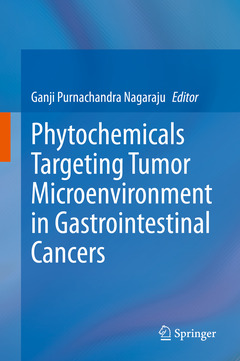Phytochemicals Targeting Tumor Microenvironment in Gastrointestinal Cancers, 1st ed. 2020
Coordonnateur : Nagaraju Ganji Purnachandra

To circumvent these difficulties, drug therapy targeting the tumor?s specific microenvironment and the additive anticancer effect of phytochemicals can allow for more effective treatment. This volume will be the first on the market on the topic of phytochemicals and their effect on the tumor microenvironment (TME). TME is an emerging area of research and the book will be a welcome introductory addition to the field.
- Current dilemmas in the treatment of GI and liver cancers
- Chemoradioresistance in GI Cancers
- Tumor microenvironment against the action of chemotherapeutic drugs in GI cancer therapy
- Role of phytochemicals on growth and metastasis of GI cancers
- Combination of phytochemicals with chemotherapy on GI cancers cell death
- Phytochemicals plus checkpoint inhibitors in GI cancers
- Phytochemical analogues for the advancement of fourth generation therapeutic drugs for GI cancers
- Phytochemicals on exosomes in GI cancers
- The role of preventitive medicine and personalized care in overcoming cancer resistance and metastasis of GI cancers
- Cancer stem cells as therapeutic targets for GI and liver cancers
- Combination of phytochemicals with nanotechnology for targeting GI cancer therapy
Focuses on the current broad range of treatment options and prospective treatments for GI cancers
Provides an understanding of the roadblocks of chemotherapy for newly-diagnosed patients and patients with metastatic GI cancers
Gives an overview on stroma, tumor microenvironment, stem cells, stellate cells, transcription factors, growth factors, and signaling pathways
Date de parution : 10-2020
Ouvrage de 340 p.
15.5x23.5 cm
Disponible chez l'éditeur (délai d'approvisionnement : 15 jours).
Prix indicatif 158,24 €
Ajouter au panier


